How to Activate Magento Business Intelligence for Merchants
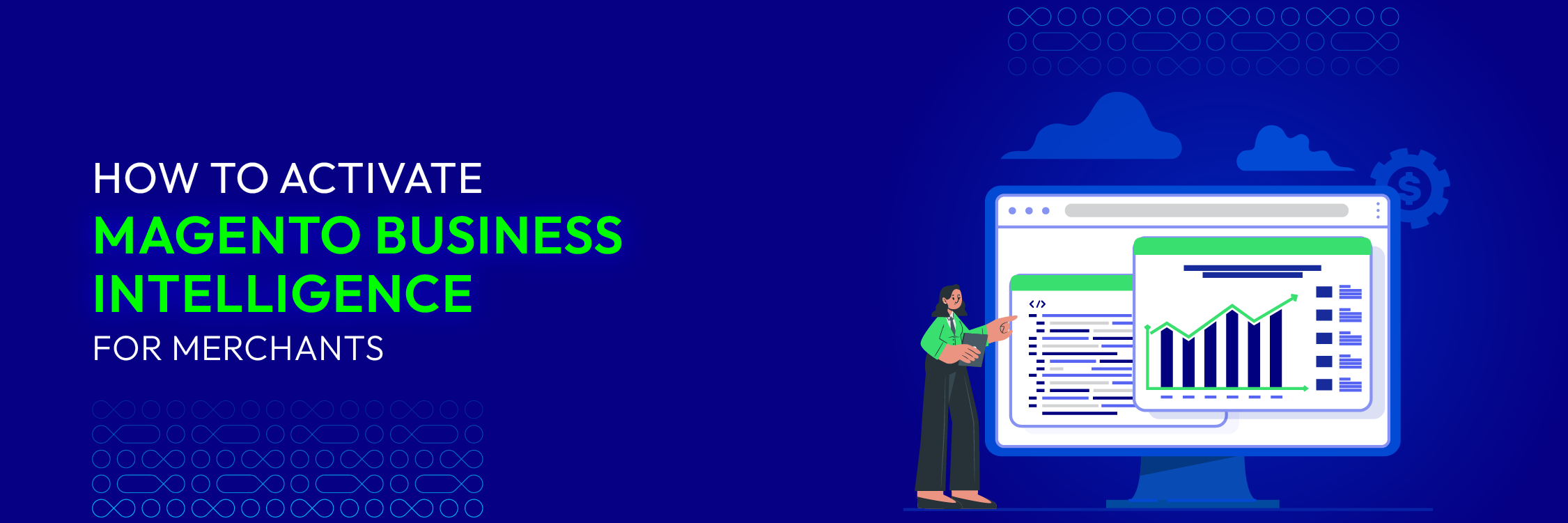
Magento Commerce is a robust, flexible, and scalable eCommerce platform packed with numerous built-in features designed to help transform and grow your business. One such feature is Magento Business Intelligence (Magento BI). This comprehensive BI suite provides Magento Commerce users with advanced tools to gain deeper insights into their overall performance.
Wondering why business intelligence is crucial, what sets Magento BI apart from other BI tools you’ve used, and how to get started? Keep reading to find out.
What is Magento Business Intelligence (BI)?
Magento Business Intelligence (BI) is a cloud-based solution that uses data analysis to assist organizations in making better decisions. It makes it simple to identify patterns and trends by bringing data from several sources together in one location.
Magento BI stands out because it can directly pull data from a client’s database. This means businesses can quickly and accurately track purchasing trends using data from any CRM system.
Magento BI Pro can also gather data from other sources like QuickBooks, Facebook Ads, Google Ads, and Salesforce. This capability saves time and allows businesses to focus on making data-driven decisions.
Magento BI consists of three main parts:
-
Data Storage Space: This is a centralized area where all data is stored. It connects directly to the Magento database and other systems used by the business. It uses advanced technology to replicate data and store it in the cloud.
-
Analysis Space: This is where reports are generated. The tool can either standardize company metrics or customize them by creating join tables and calculated columns.
-
Visualization Space: This is where data is turned into visual reports like graphs and charts. It simplifies organizing and managing user accounts, allows granting multi-level access to other users, and enables sending reports directly to email inboxes.
Why Is Magento Business Intelligence Important For eCommerce?
Integrating Magento Business Intelligence (BI) into your website offers scalability and flexibility for managing your brand’s online presence. It smoothly transitions from data collection to insightful analysis and connects businesses to a global network of partners.
Magento BI is more than just a reporting tool; it includes advanced analytics, dashboard visualizations, and data warehousing to provide a comprehensive view of your eCommerce operations. This robust functionality helps business owners enhance their strategies and improve customer retention.
Here are some compelling reasons to use Magento BI:
-
In 2020, 54% of companies said BI was “important” to their business goals. This shows that BI has gained significant credibility compared to earlier years.
-
The market for business intelligence is predicted to reach $63.76 billion by 2032, growing at a compound annual growth rate (CAGR) of 9.0% from its estimated $29.42 billion in 2023 .
Magento Business Intelligence Key Features
Data Warehouse Manager
Magento BI is cloud-based, meaning your data is stored online in the Magento Business Data Warehouse. You can access this data from any device using your account.
In addition to creating calculated columns for reports, the Data Warehouse Manager allows you to manage table and column sync settings. Data may be readily extracted for real-time analysis from a variety of sources, uploaded from unsupported integrations, and exported for in-depth examination to spot inconsistencies.
Magento Business Intelligence Dashboard
The Magento BI Dashboard consolidates data from your store and third-party platforms like Facebook and Google Ads, providing a complete data picture. You can organize this data into personalized reports, create long-term reports, or adjust them as needed. Customize your Dashboard to focus on individual data sources or get an overall view.
Data Visualizations
Magento Business Intelligence includes new visualization options: bubble charts, scatter plots, and scatter plots with trend lines. These alternatives offer more descriptive data presentation compared to traditional pie charts and linear graphs, adding extra dimensions to the bubble charts for enhanced clarity.
Reports
Magento BI allows you to schedule and automate report delivery, making it easy to keep track of information and keep everyone informed. Common reports include:
- Purchase History: Track customer purchases by date to predict sales and target marketing efforts.
- Customer Lifetime Value Prediction: Estimate customer spending to optimize marketing investments and target the right audience.
- Data History Reports: Cross-reference data from various marketing tools to get a comprehensive history.
- Marketing and Advertising ROI: Track orders and inventory, improve merchandising solutions, and identify the most valuable consumer channels.
Account Management
You can change account settings such as company name, currency, and update schedules. Decide whether to send email summaries when data isn’t updated as scheduled or wait until it is. You can also enable or disable data updates.
User Management
Assign user roles - Admin, Standard, and Read-Only, based on their organizational roles. Admins can create and manage accounts, handle integrations, and use the Data Warehouse Manager.
Magento Business Intelligence Pricing Plans
Magento BI comes in 2 editions. The comprehensive version is for companies experienced in analytics, while a streamlined version caters to smaller merchants new to data analysis.
-
Magento Business Intelligence Pro, costing $500 per month, offers an advanced solution integrating data from third-party sources and CRM databases. It includes APIs, live support, and customization options.
-
Magento Business Intelligence Essentials starts at $100 per month, providing access to over 100 pre-built reports and B2B-specific dashboards. It’s ideal for merchants looking to expand and is now bundled for Magento Open-Source customers.
How to Set Up Magento Business Intelligence?
Implementing Magento BI helps consolidate various data points into actionable insights. Here’s how to integrate Magento BI into your online store:
1. Create your BI account: To do this, contact a Customer Technical Advisor or the Adobe Account Team. The Magento team will send you an email as soon as your account is created. To create your BI password, confirm your email address, and gain access to your Commerce Intelligence account, click the link provided in the email.

2. Set your store preferences: Before configuring the database connection, complete the store information form. This step is crucial for the ‘Connect Your Database’ setup.
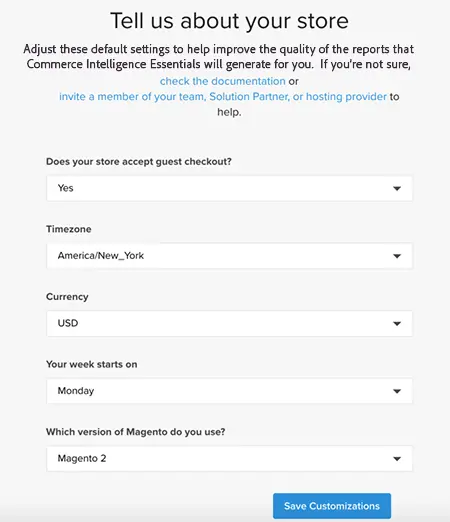
3. Add users to your business intelligence account: You can add more than one user to your business intelligence account and grant them the necessary access after checking in.
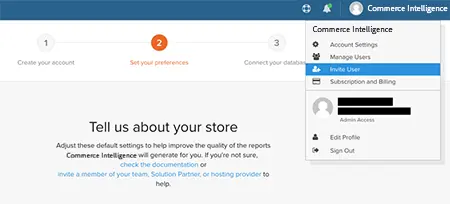
4. Create a special BI user in the Magento admin: Add a permanent user to your Commerce project to enable data fetching and transferring to the Business Intelligence Data Warehouse. This step is necessary to prevent deactivation or deletion of the account. Add the permanent user to the primary environment of the Commerce project.
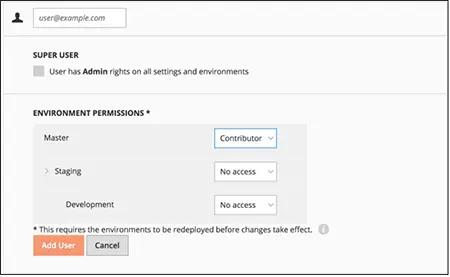
5. Access your Business Intelligence SSH keys: Go to the ‘Connect your database’ page for Business Intelligence setup. Select ‘Encryption settings’, choose ‘SSH Tunnel’ for the Encryption Type, and copy the public key from the drop-down menu.
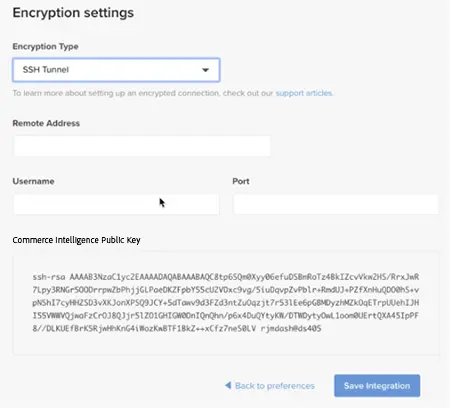
6. Add the public key to Commerce Intelligence: After logging into the Commerce Admin with the login details of the new Commerce Intelligence user:
- Go to the Account Settings tab.
- Scroll down and open the SSH Keys section.
- Click on “Add a public key” to proceed.
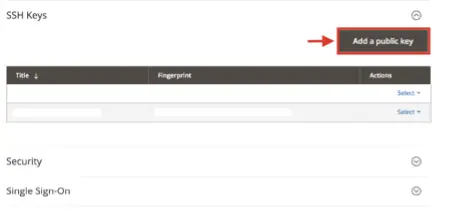
- Paste that public key from the Encryption Type step we mentioned above into the Key box.
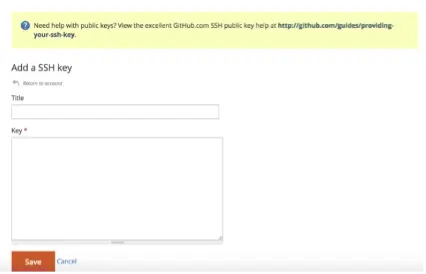
7. Provide Business Intelligence MySQL credentials:
- Update the .magento/services.yaml file.
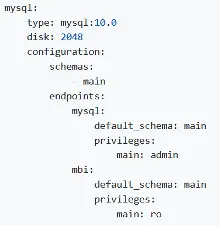
- Update .magento.app.yaml file.

8. Access the database connection details: Use the following command to retrieve the Commerce database’s database connection details and transfer them to the BI account:
| echo $MAGENTO_CLOUD_RELATIONSHIPS | base64 –decode | json_pp |
9. Link the Magento database to Business Intelligence: To add the BI details in the ‘Connect your Magento Database’ box, use an encrypted connection.
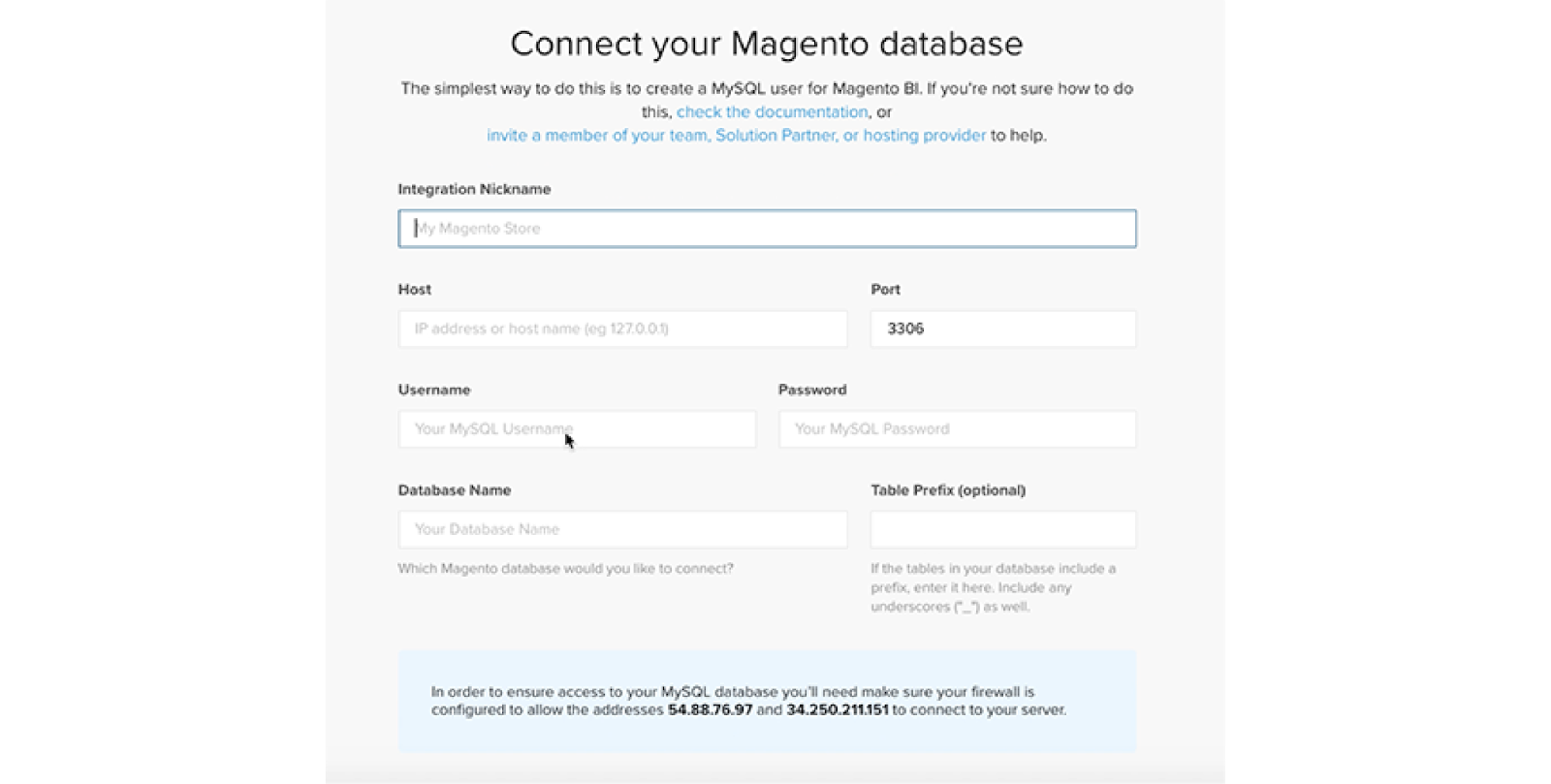
10. Adjust the Time Zone: Choose the time zone for displaying the data.
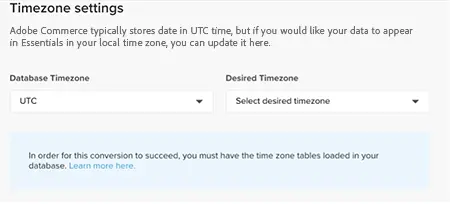
11. Go into your encryption configuration: An SSH access string is provided by the Commerce project UI to collect the data required for the Remote Address and Username. In order to locate your User Name and Remote Address, select the access site button located on the Master branch of the Project UI.
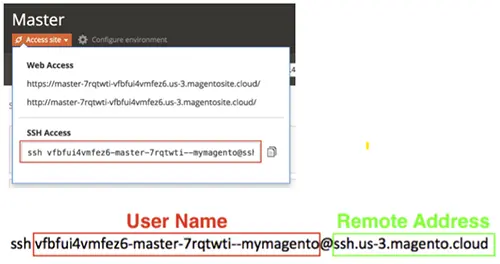
12. Save the setup: After completing the above steps, click ‘Save Integration’.
Magento BI Applications in Sales Forecasting and Customer Insights
Magento BI is instrumental in enhancing sales forecasting and gaining deep insights into customer behavior. By estimating market trends and consumer behaviors, Magento BI provides businesses with a strategic roadmap for planning and growth.
Understanding Customer Journeys and Purchasing Habits
Beyond just profit analysis, Magento BI reveals the story of the client journey. By carefully analyzing purchasing patterns and client journeys, businesses may use this knowledge to improve their strategies and increase lifetime value and customer retention.
Applying Magento Advanced Reports to Strategic Business Decisions
To utilize the Advanced Reporting tool in Magento 2, you need a Business Intelligence account and must meet the following criteria:
- The website must run on a public web server.
- The website domain must have an SSL certificate.
- Create a crontab, and ensure cron jobs are running.
- The shop view’s Base URL (Secure) setting ought to display a secure URL.
- It is necessary to select “Yes” for both the “Use Secure URLs in Admin” and “Use Secure URLs on Storefront” choices.
After meeting these requirements, you can set up Advanced Magento Reports for your online store.
Magento’s advanced reporting tools enable merchants to make informed business decisions by answering critical questions that shape the long-term strategy of an eCommerce business. With continuous updates and enhancements, these tools ensure businesses stay agile and competitive in the dynamic digital market.
Common Reports Provided by Magento BI
1. Purchase History: Track individual purchase histories by dates to identify top-selling products. This detailed information helps in targeting marketing efforts toward potential customers.
2. Estimating Customer Lifetime Value: By analyzing purchase habits, businesses can gain insights into customer preferences. Magento BI aids in estimating sales and crafting personalized marketing campaigns.
3. Reports on Data History: Tools like Google Analytics track user behavior across a Magento site. Magento BI allows cross-referencing this data for comprehensive insights into eCommerce performance.
4. Marketing and Advertising Spend ROI: The Advanced Reporting tool tracks orders and inventory, aiding in store management and determining the most effective online advertising channels, such as Facebook or Instagram.
Comprehensive Business Insights with Magento BI
Magento BI offers a holistic view of an eCommerce business’s operations, from site traffic analytics to customer conversion funnels. This comprehensive approach ensures businesses can make proactive decisions and remain prepared for changes in the digital market.
Magento Dashboard and Data Visualization
Raw data can be intimidating and challenging to understand for merchants. With the help of interactive graphs, charts, and tables provided by Magento BI, users can quickly comprehend complex data sets. This facilitates the identification of patterns and trends that could otherwise go unnoticed.

Essential indicators like client lifetime value and average order value are easily visible on a well-designed dashboard. Visualization tools, such as bubble charts and scatter plots, assist in further segmenting the data and provide a comprehensive perspective of performance across multiple dimensions.
FAQs
1. What are the advantages of Magento Business Intelligence for e-commerce companies, particularly those who use Adobe Commerce?
For ecommerce businesses, particularly those using Adobe Commerce, Magento Business Intelligence (BI) is a powerful analytics platform that provides significant benefits. It offers real-time business intelligence tools for effective data management, delivering powerful insights through extensive data analysis and comprehensive report-building features. The ability to export data for further analysis and optimization makes it an invaluable resource for users of both Adobe Commerce and Magento Open Source.
2. How is data analysis for warehouses automated by Magento Business Intelligence?
Data analysis automation in Magento Business Intelligence is achieved through its advanced business intelligence tools. These tools streamline the entire process of data collection, analysis, and reporting, reducing the need for manual effort. This automation enables warehouses and ecommerce businesses to effortlessly gain valuable insights, improving operational efficiency and decision-making.
3. What distinguishes Magento Business Intelligence as an Adobe Commerce data warehouse solution?
As a data warehouse solution, Magento Business Intelligence stands out by offering a comprehensive analytics platform specifically designed for Adobe Commerce users. It empowers Magento BI users to fully leverage their ecommerce data, providing an integrated view of business performance. The platform’s tailored features and deep integration with Adobe Commerce ensure that users can effectively utilize their data to drive growth and operational efficiency.
4. How may users of Adobe Commerce and Magento Open Source benefit from Magento Business Intelligence?
Magento Business Intelligence provides Adobe Commerce and Magento Open Source users with essential data analysis and reporting tools. These capabilities enable users to optimize their ecommerce operations by utilizing data-driven insights. By facilitating detailed analysis and clear visualization of critical metrics, Magento BI supports informed decision-making that promotes growth and enhances overall business performance.
Conclusion
In a world that is increasingly driven by data, online businesses benefit greatly from using Magento Business Intelligence. This platform optimizes the collection and use of ecommerce data. With features such as automated data analysis, cloud-based reporting, and smooth integration with multiple data sources, Magento BI becomes an indispensable toolkit for ecommerce companies.






